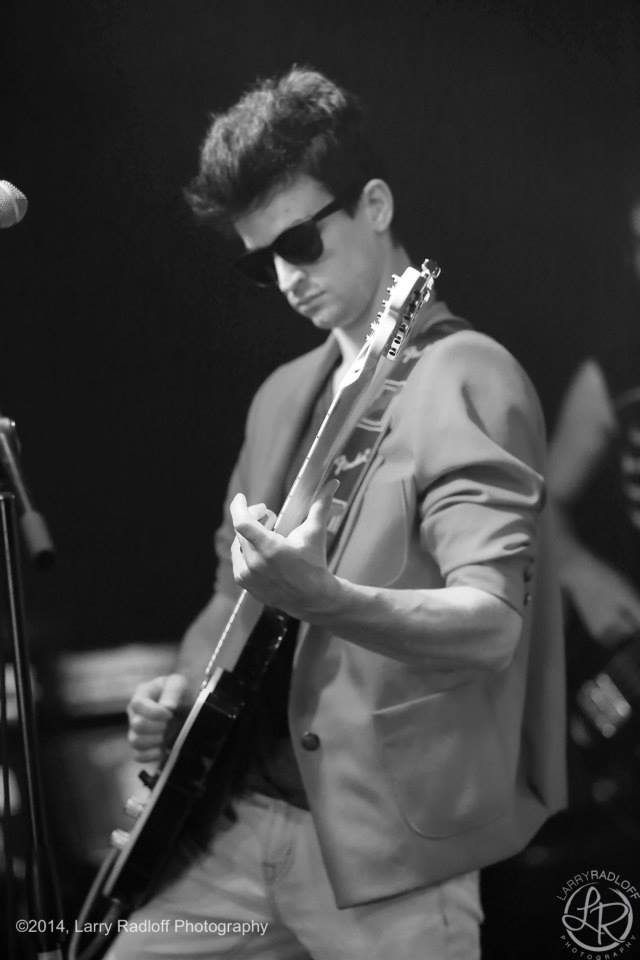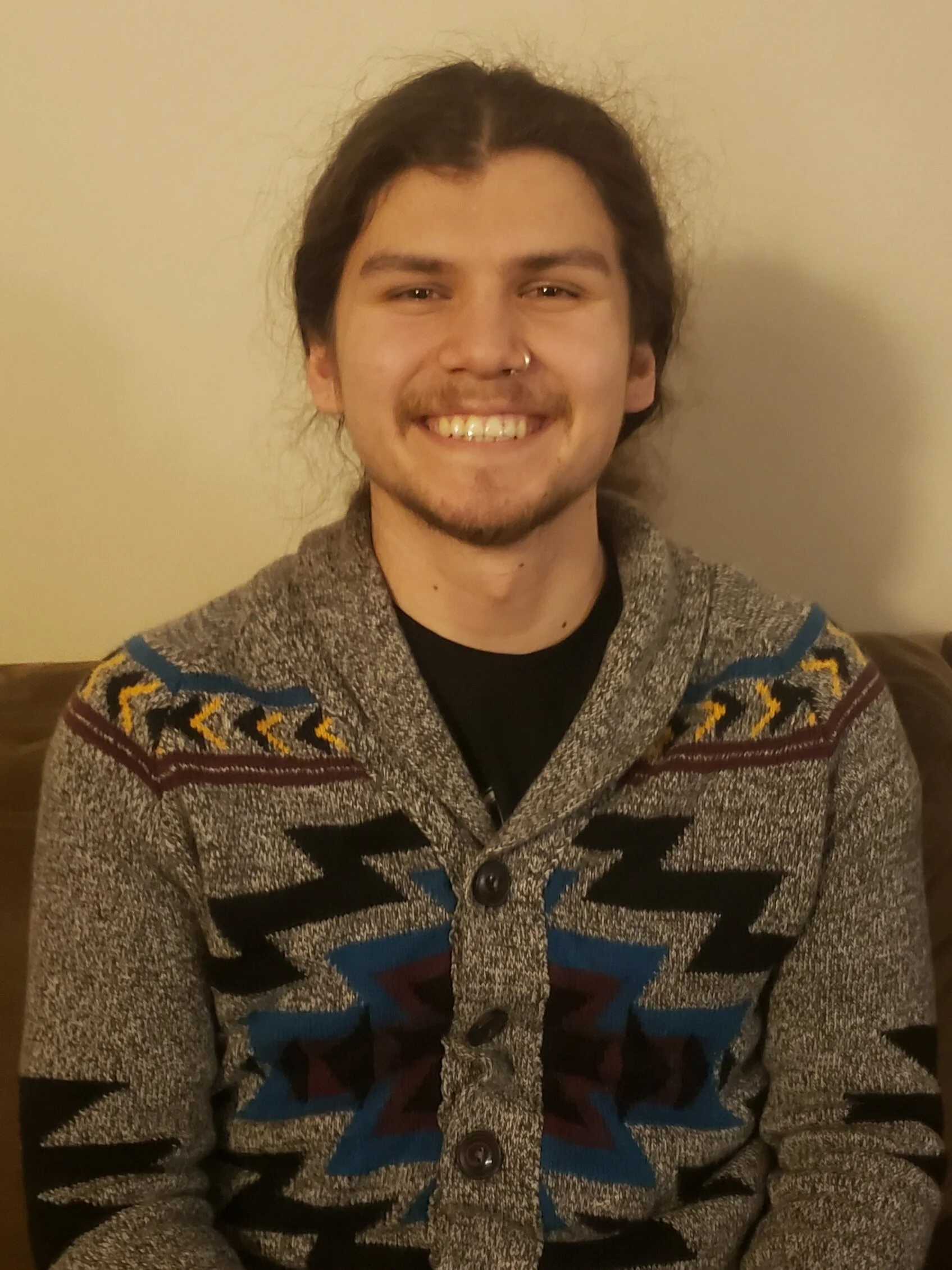Genre(s): Alternative, Folk, Indie, Pop
Instruments: Drums, Piano, Alto Sax, Guitar
I had never met Ty before this interview so I was really nervous meeting him. I realized right away that he is actually really cool and super easy to talk to! It didn't really feel like I was interviewing him, it was more like we were having a nice and friendly conversation. We actually lost a chunk of the recording, so I missed some really cool stories Ty shared with me; but I still learned so much from him. Check it out!
Ashley: How often and how long do you practice as a band?
Ty: Practicing in a band is much different from practicing on your own. If we have a show coming up and we feel really comfortable with the set, we will just play through start to finish. If we notice there is something off, that’s a little funny. We stop and work at that part. We’ll try to break it down if it’s a rhythmic thing, make sure out harmonies are correct, that we can hear each other, or see some parts are overbearing. If we find a particular line that we keeping flubbing up, we will work on it. If we do have something coming up, the main thing is we practice out set and transitions to make sure there is no dead weight. We practice for the stage.
A: Who inspires you musically?
T: Everybody. Mostly. My dad was a big influence because he was always playing when I was little. He was in a funk/R&B/blues band so I grew up on a lot of Motown, Marvin Gaye and Wilson Pickett. They played a lot of 80s and 90s so a lot of funk and rhythm sensibilities that I picked up early on translated well into soloing and grooves. Later on when I was learning piano, I got into classical and rock piano like Elton John. Also lots of classical rock, alt. pop, blues for soloing, and jazz because I was in jazz band in middle school.
A: What kind of music did you learn for each instrument you played?
T: In terms of piano, when I was taking lessons at my neighbors, it would have been a lot of pop stuff from all over the place while using early technique books and stuff like that. The first time I focused on classical music was my grade 5 Royal Conservatory of Music exam for the high school credit. I also wanted to make sure I had something in my back pocket for teaching, and grade 5 seemed like a good benchmark. I ‘ve always had classical training but started jazz band in school. I also did a little jazz on the guitar for a little bit on the drums. In band class I was playing tenor and alto sax also upright.
A: What got the band Sc Mira together?
T: Well it started with the singer Sadie and I. I was a producer for a couple of her first acoustic folk songs and then we started writing together. A year and a half ago we were started as a duo, but decided we wanted it to be a full band.
A: So then, what accomplishments are you most proud of?
T: Teaching little kids. I teach at a unique place, where at the end of the year instead of a concert or recital; we put all the kids into small bands. We then have five weeks of them rehearsing together on the same song. When you have these 6 year old on stage completely on their own, playing a rock or blues song, I guess it’s not my own accomplishment, but when I see them on the stage the feeling is so neat.
A: What do you like most about being a musician?
T: The biggest reason I like being a musician is because I’m good at it. I mean that sounds arrogant but I feel that’s fair to say. For a lot of things that people do, if you’re good at something you generally follow that path. I’m good at it and I like it. It’s an artistic challenge. It’s logical challenge with pattern forming; mathematics, science and art components. It makes people happy and you get to share that with them. You go on stage and let go, play characters if you want. Open up and tell stories. As lame as it sounds, you reach for the stars. You get to travel or tour and play with other people. I love how you get to connect with others that are not a necessarily normal [way to communication with others], like talking. It’s kind of like an extra level of interacting with people. No one really knows why he or she makes music. I think I’m just making excuses as to why I make music [laughs].
A: What advice would you give to beginners who are just starting out?
T: Suck it up, [laughs] in the nicest way possible! For me, I still get extremely nervous. Not as much in the last year or so, but I would be terrified about doing any kind of performing with other people. I still get nervous. I don’t know how I got through it all those years or what kept me going; but there is always going to be some kind of nerves with showing something so personal to other people. It takes guts to get out there. It’s not something everyone deals with on a daily basis. It’s not like your forced to go and play songs with everyone from the day you are born - like talking and walking. It’s still interesting that we don’t really understand why we connect to others with music so much.
To come out and say “ Hey I play music” and sharing such an intimate part of your like can be daunting. So to get over it, just close your eyes and jump off the cliff. Baptism by fire is the absolute best option for me. Some of the biggest things I’ve have to overcome, like when I played at the MTS Centre, that was the absolutely terrifying. If I had sat back and thought about it like “oh no I can’t do this, I’m going to mess up” I would have started doubting myself and throwing all of these things in the air that hadn’t been there before. I just closed my eyes, closed my ears, shut up and went out and did it. When I finished, the adrenaline and the feeling of accomplishment were amazing and there are very few things that match that feeling. On the flip side and you do go and make a mistake or embarrass yourself, which I have don’t countless of times, it will freak you out for a bit but it gives you really good incentive to never to that again.
Trust your gut. Trust your talent. Don’t listen to the voices in your head, just listen to the feelings; because that’s what music is. It’s feeling not thinking.
A: How do you balance music with your other obligations?
T: I’ve managed to turn music into my obligation. For example, being able to teach music as a job. I also do composing and songwriting or I produce and mix for bands, TV shows and movies; so that fits in really well. It’s difficult. But, the more I focus, the more it’s easier to become apart of my work and school life. It’s definitely a juggling act. You’ll find yourself saying “I really want to work on this right now but I have an exam tomorrow” and it’s unfortunate. I could be 100% invested in music but it would make life very difficult at the moment.
A: What is your common and successful songwriting process?
T: I would say there are three main ways I personally go about it:
1. Someone needs a song. You sit down and say. “Okay I need to come up with something.“ It’s not very inspirational; but the music will be good! The music sensibility will still be there, but you’re being told to write something. The producer will tell me “I need this, I need that” and I work on something and send it to them. They’ll tell me what they like and what they don’t and I’ll keeping working on it until it’s completed. That’s the least creative way. It’s still fun, it’s just a different kind of challenge. You’re trying to work to someone else’s schedule.
2. The second way to compose is in a group, where I might start with some kind of melody or structure and sit down at the rest of the group saying “here I have this, I don’t know where it’s going. “ I’ll play something, they’ll play something; they’ll sing something, I’ll sing something.” We’ll sit together and work on a tune or two. It might take a day or a week; but the entire band works together. It’s really interesting because you get everyone’s different ideas. It’s like sculpting a weird sculpture with everyone brining his or her own chisel. It’s a very interesting process. A good team-building project.
3. The last way to compose is the most personal way. It’s 100% just myself. I’ll hear a tidbit of a song and immediately have cogs turning in my head and out of nowhere I’ll coming up with a melody. Sometimes it can be quick, other times it will take forever. Many items it just clicks: BOOM, there it is. You’ll get an idea and sit down with it. Just keeping at it and building on it. Lots of times that will be without any instruments in front of me. When I have something I like, I’ll run to an instrument to try it out. I’ll even try to record it to make sure I don’t forget it. I usually don’t but it’s a good safety net. The third option is the way I write most of my own personal stuff.
A: Anything you are currently working on that you would like to share? Upcoming performances?
T: Nothing until the EP or Album release. We are releasing it at the West End Cultural Centre in June. Once we finish that show, we are going on the road for three weeks. We have a big tour across Canada and the United States planned.
Support Winnipeg Band Sc Mira!
If you like this post, please hit the like and share button below! Please reach out to me via Twitter or my contact page! I would love to hear anything you have to say! Really, anything. I'm lonely. Also I now have a new Facebook page that will let you know when each post is posted! I would really appreciate if you could like it! Thank you!


















